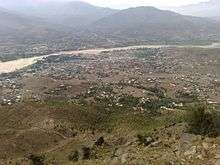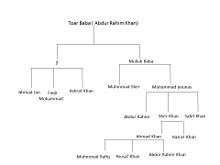Dara Utmankhel

Dara Utmankhel (Pashto: دره اتمان خیل), also known as Shaikhan, is a valley in Lower Dir District, Pakistan. It is composed of nine villages: Maniband ما نی بند, Jabaghi جبګۍ, Zara Doghay زړه ډوګۍ, Koot Kusha کوټ کو شاه, Sarebegham سا رۍ بيغم, Koot کوټ, Ghonday غونډئ, Fazal Abad and Shah Kuroonu شاه کو رونه.
It lies in Timergara tehsil, east of the road from Timergara to Dir. The inhabitants of this area belong to the Mandal, clan of Utman Khel. The Utmankheil is one of karlanri pashtoon tribes.
Coordinates: 39.999°N 0.026°W
History
.jpg)
Abdur Rahim Khan
Abdur Rahim Khan was born in Bajawar and belonged to the Utmankheil tribe of Pukhtuns. He migrated from Bajawar in the late seventeenth century and settled in Timergara. He was known as Toar Baba for his piousness. Abdur Rahim Khan and Akhund Ilyas (d.1676 A.D) were disciples of Shaikh Adam Binori (ref. Mulana Habib Ahmad of Morany, Dir)[1] and according to Muhammad Amin Badakhshi most followers and Khalifas of Adam Binori were Afghan people that made suspect Binori in the eyes of the Mughal officials and nobility. His shrine lies in the graveyard named after him. The people of Jandol, Dir Khas, Maidan, Adenzai, Swat, Bajaur and Malakand Agency used to visit the shrine but local clerics issued decrees declaring it as ‘Bid’at’ or forbidden in Islam. There are two other tombs in Moranay (Dir Lower) and Shagokas (Dir Lower) with names of Toar Baba, and their descendants in the area assumed the same clan, Mandal (who was the elder son of Baba Utman). According to Qazi Abdul Haleem Asar Afghani, the original name of Toar Baba in Moranay village was Muhammad Anwar Baig.[2] It is possible that these three were brothers or belong to the same clan because Toar Baba and Akhund were used as religious titles at that time. For example, the father of Akhund Ilyas was also known as Toar Baba but nobody knows about his real name.[3]
Descendants

Toar Baba had two sons and their descendents live in the closely situated nine villages. These people are also known as Shaikhan which are not representing their ethnicity but it is related with Abdur Rahim Khan who got this title after following Shaikh Adam Binori.Sheikh that literally means "elder". It is commonly used to designate the front man of a tribe who got this title after his father, or an Islamic scholar who got this title after graduating from the basic Islamic school. Akhund khel and shaikhan are various tribal communities in Pakistan and Afghanistan that were simply "spiritual fraternity" of unrelated disciples of pious personalities e.g., Akhund khel are pashtoon tribes but there are also akhund khel that are known as Sadat. Another group that identifies as Sheikh Mohammadi but there exist no kinship connection.[4]
In the 18th century, one of his great-great-great grandson, Zaer Mohammed, the close friend of Umara Khan, who had protected Ghandigar Qela, defeated 150 invaders of Sharif Khan but later on he became the close ally of Sharif khan. The Shairf and then Aurangzeb (1904-1925) and Nawab Shah Jehan selected many persons in his cabinet from his family. The other reason that Sharif had great respect for Toar Baba and for the bravery of these people. They are known as most united pashtoon in the area.The jirga system still exists and most disputes are resolved by local elders.
People and Economy
The total population is about approximately 2900 according to 1998 census. The area has poor agriculture system so their main economy is based on Middle East.The education ratio is high in males. There are only five primary schools and lacking middle and high schools.